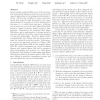Free Online Productivity Tools
i2Speak
i2Symbol
i2OCR
iTex2Img
iWeb2Print
iWeb2Shot
i2Type
iPdf2Split
iPdf2Merge
i2Bopomofo
i2Arabic
i2Style
i2Image
i2PDF
iLatex2Rtf
Sci2ools
215
click to vote
SDM
2011
SIAM
2011
SIAM
Sparse Latent Semantic Analysis
Latent semantic analysis (LSA), as one of the most popular unsupervised dimension reduction tools, has a wide range of applications in text mining and information retrieval. The key idea of LSA is to learn a projection matrix that maps the high dimensional vector space representations of documents to a lower dimensional latent space, i.e. so called latent topic space. In this paper, we propose a new model called Sparse LSA, which produces a sparse projection matrix via the 1 regularization. Compared to the traditional LSA, Sparse LSA selects only a small number of relevant words for each topic and hence provides a compact representation of topic-word relationships. Moreover, Sparse LSA is computationally very efficient with much less memory usage for storing the projection matrix. Furthermore, we propose two important extensions of Sparse LSA: group structured Sparse LSA and non-negative Sparse LSA. We conduct experiments on several benchmark datasets and compare Sparse LSA and its ex...
Related Content
| Added | 17 Sep 2011 |
| Updated | 17 Sep 2011 |
| Type | Journal |
| Year | 2011 |
| Where | SDM |
| Authors | Xi Chen, Yanjun Qi, Bing Bai, Qihang Lin, Jaime G. Carbonell |
Comments (0)

